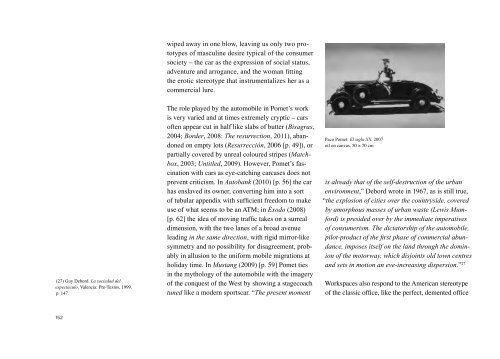CONTRA LA INERCIA AGAINST INERTIA - granada cultura
CONTRA LA INERCIA AGAINST INERTIA - granada cultura
CONTRA LA INERCIA AGAINST INERTIA - granada cultura
Create successful ePaper yourself
Turn your PDF publications into a flip-book with our unique Google optimized e-Paper software.
(27) Guy Debord. La sociedad del<br />
espectáculo. Valencia: Pre-Textos, 1999.<br />
p. 147.<br />
152<br />
wiped away in one blow, leaving us only two prototypes<br />
of masculine desire typical of the consumer<br />
society – the car as the expression of social status,<br />
adventure and arrogance, and the woman fitting<br />
the erotic stereotype that instrumentalizes her as a<br />
commercial lure.<br />
The role played by the automobile in Pomet’s work<br />
is very varied and at times extremely cryptic – cars<br />
often appear cut in half like slabs of butter (Bisagras,<br />
2004; Border, 2008: The resurrection, 2011), abandoned<br />
on empty lots (Resurrección, 2006 [p. 49]), or<br />
partially covered by unreal coloured stripes (Matchbox,<br />
2003; Untitled, 2009). However, Pomet’s fascination<br />
with cars as eye-catching carcases does not<br />
prevent criticism. In Autobank (2010) [p. 56] the car<br />
has enslaved its owner, converting him into a sort<br />
of tubular appendix with sufficient freedom to make<br />
use of what seems to be an ATM; in Éxodo (2008)<br />
[p. 62] the idea of moving traffic takes on a surreal<br />
dimension, with the two lanes of a broad avenue<br />
leading in the same direction, with rigid mirror-like<br />
symmetry and no possibility for disagreement, probably<br />
in allusion to the uniform mobile migrations at<br />
holiday time. In Mustang (2009) [p. 59] Pomet ties<br />
in the mythology of the automobile with the imagery<br />
of the conquest of the West by showing a stagecoach<br />
tuned like a modern sportscar. “The present moment<br />
Paco Pomet: El siglo XX, 2007<br />
oil on canvas, 50 × 70 cm<br />
is already that of the self-destruction of the urban<br />
environment,” Debord wrote in 1967, as is still true,<br />
“the explosion of cities over the countryside, covered<br />
by amorphous masses of urban waste (Lewis Mumford)<br />
is presided over by the immediate imperatives<br />
of consumerism. The dictatorship of the automobile,<br />
pilot-product of the first phase of commercial abundance,<br />
imposes itself on the land through the dominion<br />
of the motorway, which disjoints old town centres<br />
and sets in motion an eve-increasing dispersion.” 27<br />
Workspaces also respond to the American stereotype<br />
of the classic office, like the perfect, demented office


